The origin of proper names has deep roots. They have existed since time immemorial. Even at the time of the creation of man, God called him by the name Adam, that is, "from clay." Adam gave names to the animals, and then called his wife Eve, that is, "life." Since then, a person's ability to give names to everything, or, as the Russian proverb says, “to call a spade a spade”, has become an integral feature of him.
Therefore, one should not be surprised that often a person has several names - one official, two or three affectionate domestic ones, one - a nickname in a narrow circle of friends, one - a nickname in a team. So, for example, the boy Vanya Nosov can be both the Sun and Masik at home, the Nose at school and Vano with friends.
It is now accepted to use the official name to identify the person. It is written in the passport or in the birth certificate. But it was not always so. Names and nicknames used to circulate alongside official names.
In ancient times
People in ancient times believed that the name carries a magical beginning, that itdefines character. The meaning of the name was taken very seriously. Being dependent on the forces of nature, the harvest and the disposition of the powerful of this world - priests, princes, military leaders and the like, those in power - at the same time they were afraid to fall into disfavor with evil spirits. Now it is clear why sometimes the true name was hidden, giving the child a name-nickname. It was meant to ward off evil and was used more than the true name.
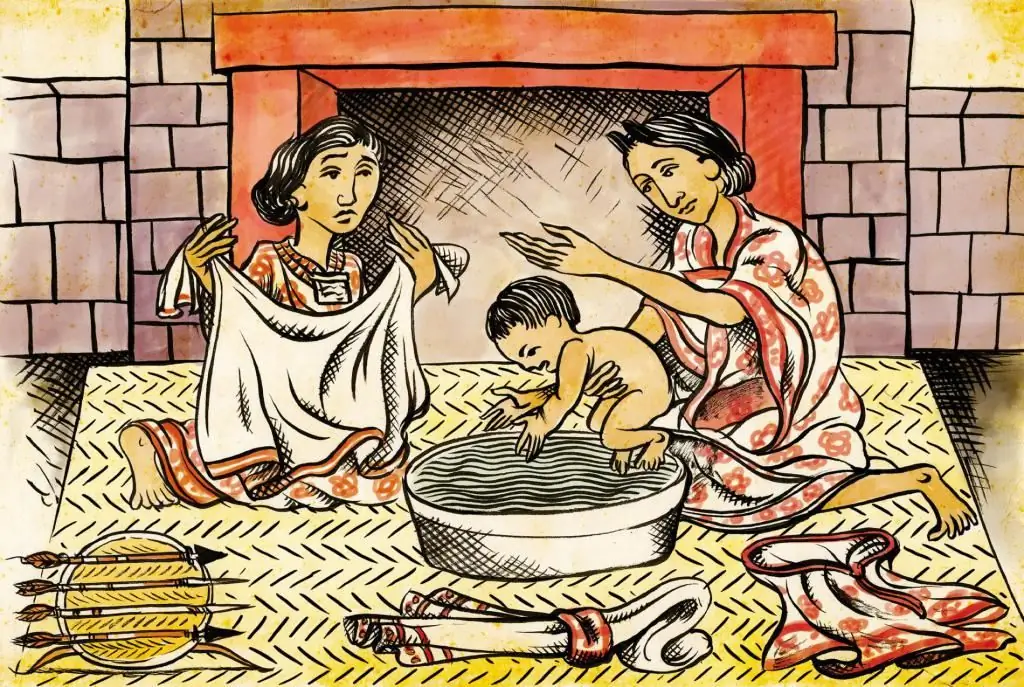
Using the real name, the priests performed rites of initiation, marriage, taboos for sins and others. On behalf of the clan, sacrifices were made to the gods. Rulers gave their child a name whose origin comes from the name of a totem or a common ancestor.
In the third century BC, the philosopher Chrysippus identified names as a separate group of words. In fact, it can be called the founder of the modern science of names - anthroponymy (Greek ἄνθρωπος - person and ὄνοΜα - name).
How did the word "name" come about?
In dictionaries there is an explanation of this word as a tracing paper from the Latin nōmen or Greek ὄνοΜα. There are versions that it comes from the special term jm-men, which denotes the accepted sign of the tribal system. In general, it is noticeable that the Slavic languages have a similar pronunciation and spelling of this word.
One version is that it comes from the Proto-Slavonic have - to have, identify with someone, take for someone, consider someone. Another relates it to the concept of yuyoti, which in Sanskrit means separation ordifferentiating one from another. Interestingly, the origins of the English name are the same as the Greek onoma. It turns out that in the Indo-European group of languages, according to this version, there is one source of the word "name" - for both Western European and Eastern European languages.
But most dictionaries agree that the true etymology of the word "name" is unclear.
In ancient times
Greek names often coincide with the names of mythical characters. Giving a baby the name of a hero was considered to anticipate his fate in some way. And, on the contrary, they were afraid to call babies by the names of the gods. There was an opinion that using the name of a god in such a vein would be regarded by him as familiarity, humiliating his position.
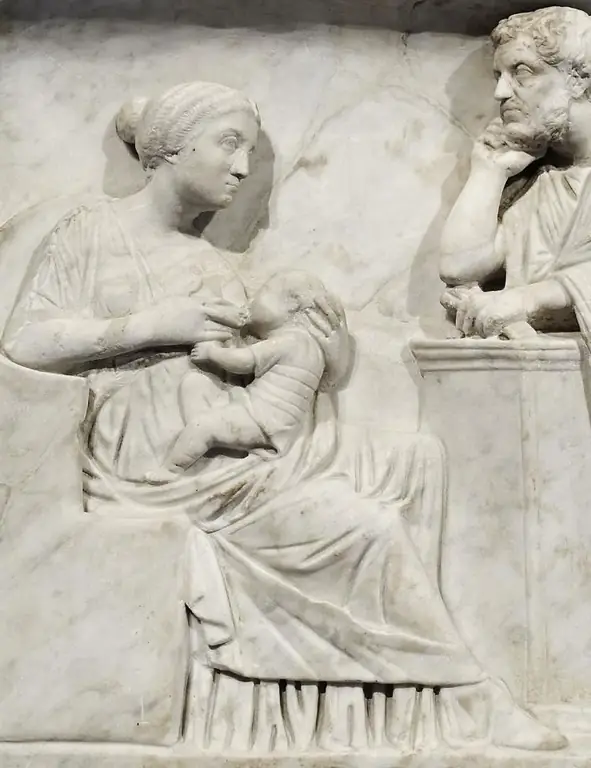
For the everyday designation of the gods, there were a lot of epithets, which sometimes became the name of a person. The etymology of the names of ancient times goes back to similar titles. These are, for example, such substitutes for the name of Zeus that have survived to our time, such as:
- Victor is the winner.
- Maxim is great.
Or a description of Mars, the god of war, wearing a victorious wreath of laurel leaves:
- Laurel.
- Lawrence.
Other gods wore a diadem, they were called "Crowned". Names derived from this name:
- Stefan.
- Stepan.
- Stefania.
The names of not the supreme gods, but the patrons of hunting, various types of art were considered not shameful to give to a person:
- Muse.
- Diana.
- Aurora.
These ancient names are still known.
Name in Ancient Russia
The attitude to the name in Russia rather resembled ancient pagan ideas. Therefore, only the initiates knew the real name - parents, close people and priests. It carried a positive charge, meant happiness, we alth, he alth and everything that a baby usually wants. These are such names of Russian origin as:
- Love.
- Gold.
- Power.
- Bogdan.
- Zhdan.
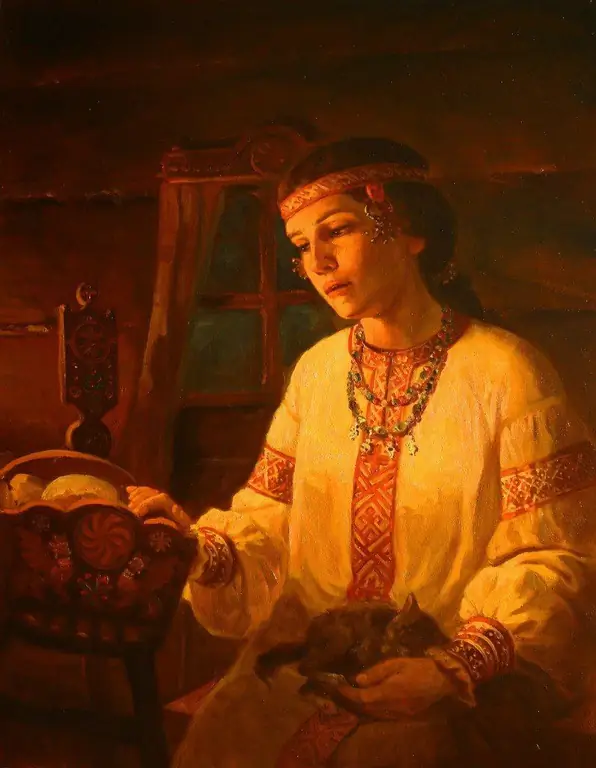
An interesting custom of the Slavs after naming a child by his real name is to stage the discovery of a foundling. The baby was wrapped in an unusable cloth - matting, for example, and taken out of the door. For evil spirits, they pronounced a second name-nickname, a kind of amulet, which should send evil spirits on the wrong track. The etymology of amulets - from imaginary shortcomings that were attributed at that moment:
- Unbeautiful
- Unexpected.
- Winter.
- Curves
- Chernyak.
- Be white.
The real name did not sound in everyday life. To the question: "What is your name?" they answered evasively: "They call Zovutka, they call it a duck." This was done for fear of damage.
How the adoption of Christianity influenced
Starting from the eleventh century, everything Slavic was systematically ousted from folk life: a system of worship, a way to bury the dead, tales and epics. This includes naming as well. The Greek form of Christianity came to Russia, so Byzantine culture began to be planted.
The name written inparish book. The etymology of names of this type has Greek and Jewish roots, which is due to the language of church books. The official name was used in the rites of baptism, marriage, anathematization and others. The two-name system began to be practiced among the people: now there was no need for a name-amulet, but there was no trust in Greek names either. Some were so difficult to pronounce that they were transliterated into Russian forms:
- Fyodor - Theodore (God's gift).
- Avdotya - Evdokia (favor).
- Aksinya - Ksenia (hospitable).
- Luceria - Glyceria (sweet).
- Egor - George (farmer).
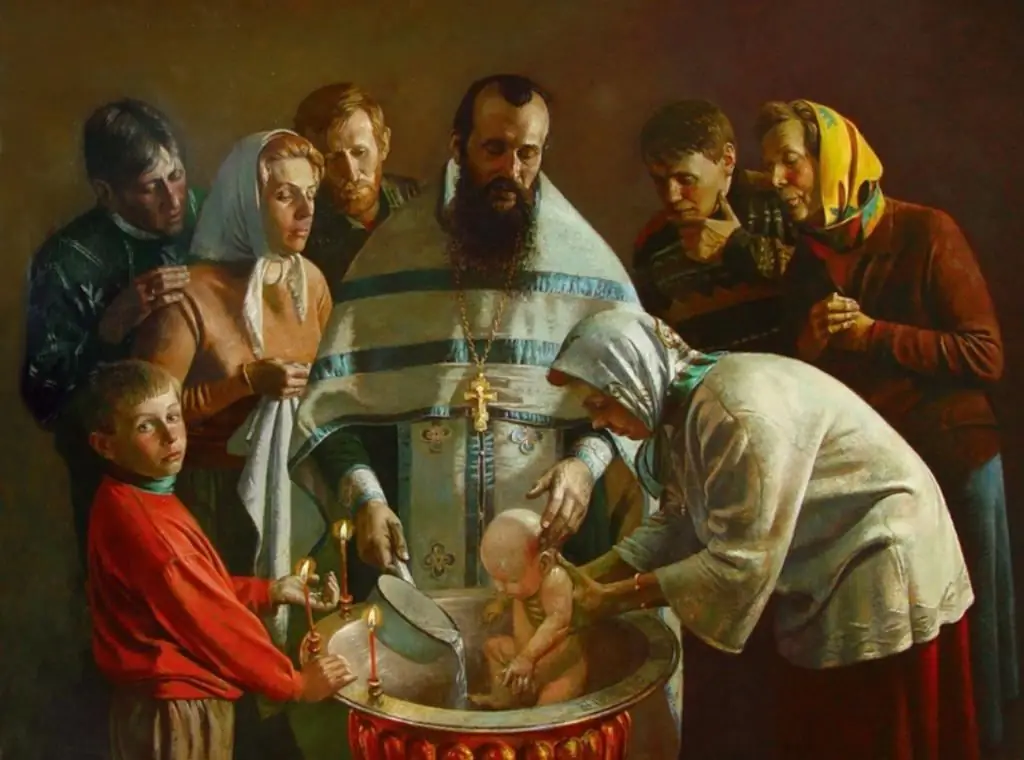
In legal documents, both names began to be indicated: one by baptism, the other worldly: "By baptism Peter, by worldly Mikula." When surnames were introduced in Russia, it often became a worldly name.
Names in the Saints
Because birth registration was only possible in the church, even in the case of unbelieving parents, everyone went through the rite of baptism. The name was given by the priest, choosing it from the calendar. This is a book in which for each day there is a list of saints whom the church should honor. She was popularly called "Saints". The etymology of names from the Menologion has not only Greek or Jewish roots. Many saints canonized in Russia have Latin, Germanic and Scandinavian names.
Some names are found in the month word more often than others. This explains that there are so many Ivanovs in our country: they are commemorated in the Saints 170 times. Originfemale names in Saints have foreign roots, and therefore often dissonant for Russians:
- Christodula.
- Yazdundokta.
- Chionia.
- Philicity.
- Pulcheria.
- Prepedigna.
- Perpetua.
- Mamika.
- Kazdoya.
- Domna.
- Golinduha.
There were several names for parents to choose from. If the priest was disposed towards the parents of the baby, he made concessions and allowed him to choose a name from the Saints on his own. But in the event of a quarrel, he could be strict or even give the child an unpronounceable name.
Girl names: origin and meaning
The impossibility of freethinking, which included the independent choice of a name for a daughter that is not listed in the Saints, led to the spread of female names of Slavic or European origin. Many holy women, canonized by the church, had beautiful names.
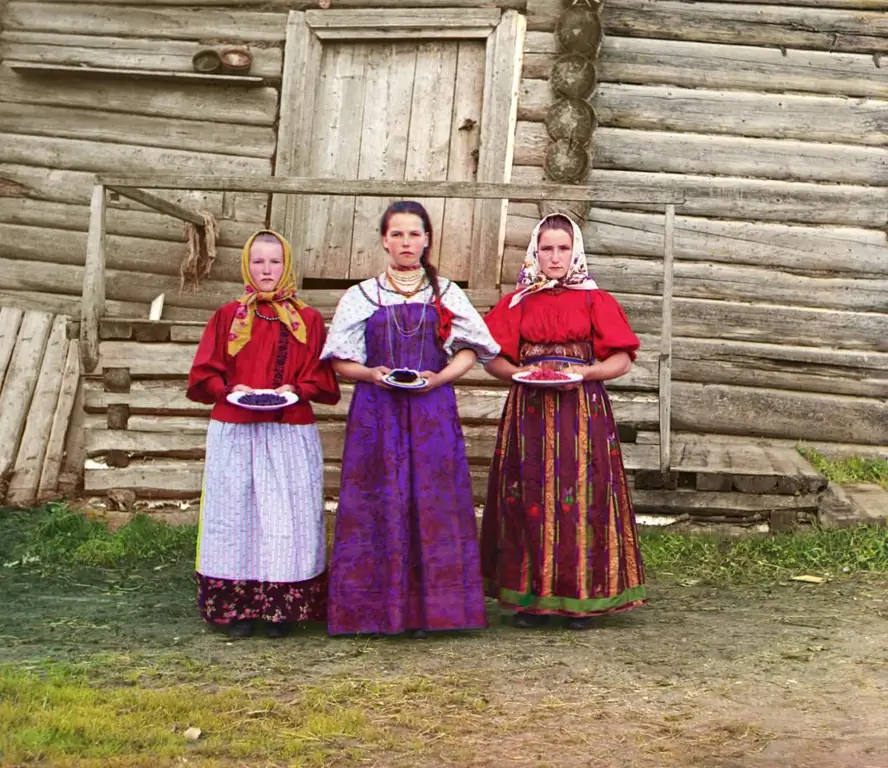
It is clear, therefore, that mainly in Russia there were female names Maria, Martha, Praskovya, Anna, Tatyana, Natalya, Olga and a few more. The names Hope and Love were popular, although they were mentioned in the Saints only once. Vera had two mentions.
After the 1917 revolution, the church registration system was abolished. This influenced the choice of names. There were some twists: the origin of the girls' names now depended on the parents' loy alty to the new government and admiration for their technological progress.
Names in the USSR
Origin of some early twentieth century female namesstrikes the imagination. Nevertheless, these names really existed, and they are now recorded in the acts of the registry offices. To get an idea of the scale of what happened then, just look at the following table.
| Names derived from the slogans: "Long Live…", glorifying the people of Honduras, peace, the link between the city and the countryside and the World Revolution | Dazdranagon, Dazdamir, Dazdrasmygda, Dazworld |
| The names of the times of industrialization were given in honor of cars, railways or shipyards | Tractorina, Railcar, Zheldora, Shipyard |
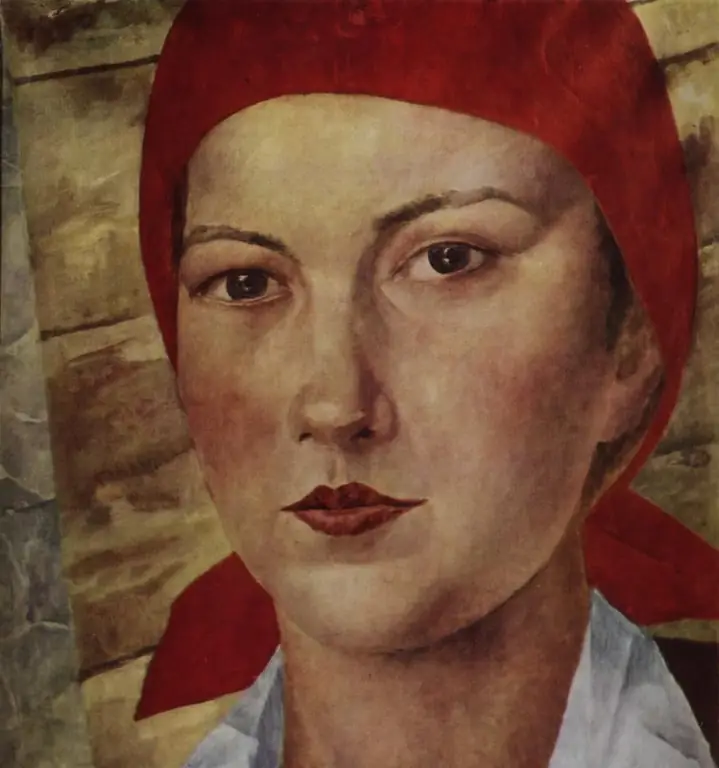
Fortunately, it was a short period. After that, many changed their names, opting for the usual common Marias and Tatyanas. With the development of the film era, the names of screen heroines and film actresses began to spread, often of Western origin.
Russian names of foreign origin
Perhaps, some will be surprised that the name Ivan, considered to be native Russian, is actually the Jewish John. It means "God has mercy." Danila - also an old Russian name - translated from Hebrew means "God is my judge." And these are not the only Jewish names on the list:
- Sysy - white marble.
- Fadey is worthy of praise.
- Foma is a twin.
- Gavrila - my power is God.
- Matthew is a gift from God.
Names with Scandinavian roots:
- Olga is a saint.
- Igor is militant.
- Oleg is a saint.
Statistics saythat the distribution of modern names by origin is as follows:
- 50% - Greek, largely due to Christianization and the ban on pagan names that are not in the Saints.
- 20% - Hebrew, for the same reason.
- 15% - Latin, spread through the development of trade and the Enlightenment.
- 15% - others.
It is sad that history has not preserved many ancient names. But now there is an interesting trend in society that can correct the situation.

Modern names
Old Slavic names are in fashion now, many of which have a beautiful sound and explanation. Girls are called like this:
- Vladislav (famous).
- Lada (favorite).
- Rusalina (fair-haired).
- Yarina (fiery).
- Milana (caring).
- Alina (honest).
Boys have these names:
- Vsevolod (owner of everything).
- Lyubomir (beloved by the world).
- Yaroslav (bright glory).
And parents choose the name to their liking, no one obliges to name children according to the approved list. The part -slav, which is part of the compound name, means the generic name of the Slavs. There is a return to historical roots.
Conclusion
Now you can be called by any name. Of course, extremes should be avoided. In some countries it is forbidden to be called demonic names, recognized common names of world criminals or numerals.
Loving parents think about how a childwill go through life. And it depends a lot on the name.






